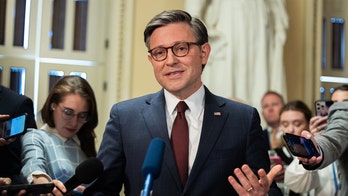The White House said Friday it is considering using part of the $700 billion Wall Street rescue fund to prevent the domestic auto industry from failing.
Dana Perino, a spokeswoman for President Bush, said it would be "irresponsible" to further weaken the economy by letting Detroit's Big Three automakers fail. Perino said the White House normally would prefer to let the financial markets determine the companies' fate.
But she said that given the economy's shape, the White House will consider other options if necessary to prevent the automakers' collapse -- and that could mean using money from the $700 billion Wall Street rescue.
Perino made the remarks as Bush flew to Texas for a commencement speech, just hours after a deal on $14 billion in aid to automakers collapsed. The deal fell apart Thursday night in the Senate despite intense negotiations on Capitol Hill between lawmakers, union officials and representatives from the three companies.
"It's disappointing that Congress failed to act tonight," Deputy Press Secretary Tony Fratto said in a statement Thursday. "We think the legislation we negotiated provided an opportunity to use funds already appropriated for automakers and presented the best chance to avoid a disorderly bankruptcy while ensuring taxpayer funds only go to firms whose stakeholders were prepared to make difficult decisions to become viable."
The bailout died after failing 52-35 on a Senate procedural vote.
Earlier in the evening, the talks appeared to have produced a breakthrough, with Democratic leaders "hopeful" that an agreement had been reached that would be acceptable to Senate Republicans, who have resisted the aid package. But Senate Majority Leader Harry Reid came back later to report the effort had failed, adding he was "terribly disappointed."
Reid called the bill's collapse "a loss for the country," adding: "I dread looking at Wall Street tomorrow. It's not going to be a pleasant sight."
House Speaker Nancy Pelosi released a statement after the bill was blocked, saying: "Senate Republicans' refusal to support the bipartisan legislation passed by the House and negotiated in good faith with the White House, the Senate and the automakers is irresponsible, especially at a time of economic hardship. The consequences of the Senate Republicans' failure to act could be devastating to our economy, detrimental to workers, and destructive to the American automobile industry unless the president immediately directs Secretary Paulson to explore other short-term financial assistance options, including TARP and those available to the Federal Reserve. That is the only viable option available at this time."
Senate Banking Committee Chairman Chris Dodd said a "lot of people are going to get hurt by this."
"It will be a long time before I forget these votes," Dodd said. "Of all the filibusters that occurred this session, this one will have more economic impact."
Republicans, after reviewing the latest version of the proposal in a closed-door meeting, balked at giving automaker federal aid unless their powerful union agreed to slash wages next year to bring them into line with those of Japanese carmakers.
Republican Sen. George V. Voinovich of Ohio, a strong bailout supporter, said the United Auto Workers was willing to make the cuts, but not until 2011.
The collapse of the latest negotiations came as the Wall Street Journal reported Thursday evening that General Motors had hired lawyers and bankers to consider whether to file for bankruptcy, a prospect made more likely by the outcome of Thursday's talks.
Democratic leaders and the White House made final pleas for the bill's passage on Thursday, but the two sides in the Senate failed to forge a compromise.
The House approved the plan late Wednesday on a vote of 237-170. It would infuse money within days into cash-starved General Motors Corp. and Chrysler LLC. Ford Motor Co., which has said it has enough cash to make it through 2009, would also be eligible for federal aid.
The plan would also create a government "car czar," to be named by President Bush to dole out loans, with the power to force the carmaker into bankruptcy next spring if they didn't cut quick deals with labor unions, creditors and others to restructure their businesses and become viable.
But the legislation has met strong opposition from many Republicans -- including Minority Leader Mitch McConnell -- who claim it does not require enough accountability from auto makers. The Republicans planned to filibuster the legislation to prevent its passage in the U.S. Senate.
FOX News' Trish Turner and Chad Pergram and the Associated Press contributed to this report.




